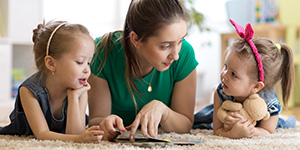Overview
From the age of three, children in early childhood settings begin to interact more with their peers than they do with their caregivers. This means that much of their cognitive, language and social skills learning happens during peer interaction. They get to practice taking turns in conversation, using their vocabulary, negotiating, collaborating, sharing and problem-solving.
But what about the children who tend to play alone or watch from the sidelines? Children who are frequently left out of interactions miss important opportunities to practice their developing skills, build their confidence and make friends.
Whether you work directly with children in early childhood settings, or consult to educators who work in those settings, you will come away from this e-Seminar with evidence-based ideas to:
- Encourage and support peer interaction by making strategic changes in classroom set-up and using specific interaction techniques.
- Raise the profile of children who are more isolated so that they are more likely to be included in interactions.
- Become more intentional and strategic in the way you support peer play in order to make the biggest difference for all children.






